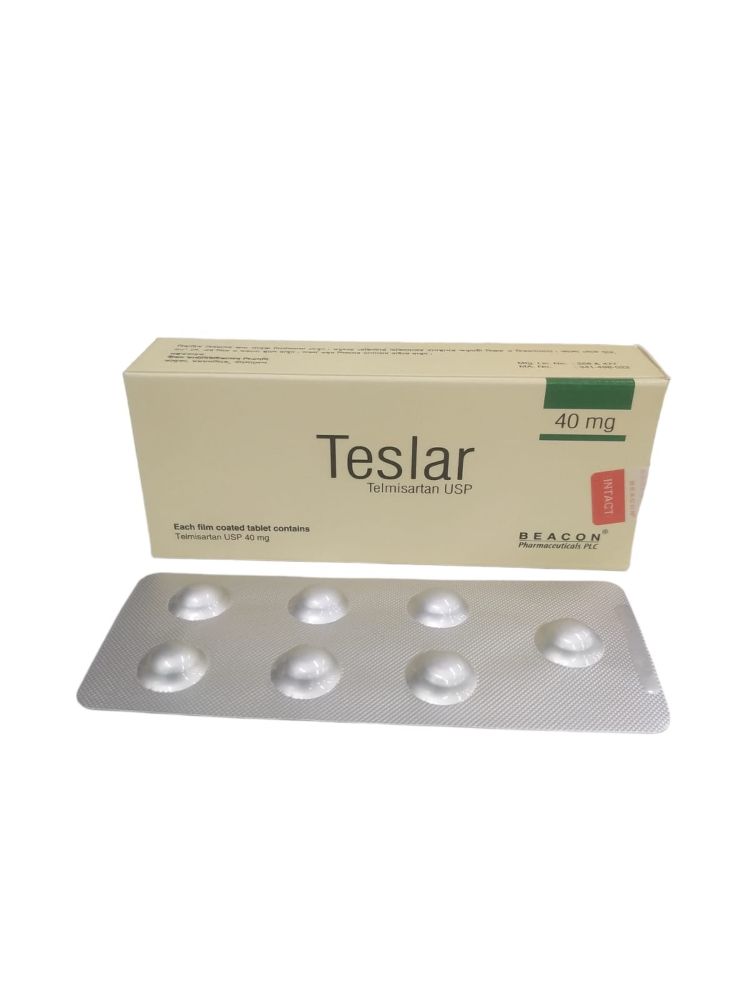
Type:7 Tablets
Generic Name:Telmisartan
Manufacturer:Beacon Pharmaceuticals Ltd.
Price:৳91.00
Hypertension in adults, Reduction of cardiovascular morbidity in adults with atherothrombotic cardiovascular disease, (history of coronary heart disease, stroke, or peripheral arterial disease), Type 2 diabetes mellitus, with documented target organ damage.
May be taken with or without food.
Oral Hypertension Adult: Dosage must be individualized. The usual starting dose of Telmisartan tablets is 40 mg once a day. Blood pressure response is dose-related over the range of 20 to 80 mg. Most of the anti hypertensive effect is apparent within 2 weeks and maximal reduction is generally attained after 4 weeks. When additional blood pressure reduction beyond that achieved with 80 mg Telmisartans is required, may switch to combination, a diuretic may be added. Telmisartan tablets may be administered with other antihypertensive agents. Initial therapy with Telmisartan is not recommended in patients >75 years old or with hepatic impairment Elderly: No initial dosage adjustment is necessary for elderly patients. Cardiovascular risk reduction Adult:The recommended dose of telmisartan tablets is 80 mg once a day. It is not known whether doses lower than 80 mg of telmisartan are effective in reducing the risk of cardiovascular morbidity and mortality. When initiating telmisartan therapy for cardiovascular risk reduction, monitoring of blood pressure is recommended, and if appropriate, adjustment of medications that lower blood pressure may be necessary. Hepatic impairment: Initial therapy with telmisartan is not recommended in patients ?75 years old or with hepatic impairment.
<18 years old: Safety and efficacy not established
Renal impairment: No initial dosage adjustment is required for patients with mild to moderate renal impairment. Titrate slowly in patients with severe renal impairment. Patients on dialysis may develop orthostatic hypotension; their blood pressure should be closely monitored.
Severe hepatic impairment, biliary obstructive disorders. Pregnancy. Lactation.
Telmisartan blocks the vasoconstrictor and aldosterone-secreting effects of angiotensin II by selectively blocking the binding of angiotensin II to the AT1 receptor in many tissues, such as vascular smooth muscle and the adrenal gland. Its action is therefore independent of the pathways for angiotensin II synthesis.
Avoid fetal or neonatal exposure, Hypotension, Monitor carefully in patients with impaired hepatic or renal function, Avoid concomitant use of an ACE inhibitor and angiotensin receptor blocker. Hepatic insufficiency, biliary obstruction, renal impairment, renaly artery stenosis. Correct volume depletion before initiating treatment. Monitor serum potassium levels regularly, especially in elderly and renally-impaired patients.
1-10% Upper respiratory tract infection (URTI) (7%),Back pain (3%),Diarrhea (3%),Myalgia (3%),Sinusitis (3%),Chest pain (1%),Hypertension (1%),Headache (1%),Dizziness (1%),Pharyngitis (1%) <1% Abnormal ECG,Anemia,Angina,Angioedema,Bradycardia,Eczema,Epistaxis,Gout,Hypercholesterolemia,Hyperkalemia,Hypoglycemia,Otitis media Potentially Fatal: Rarely angioedema, rash, pruritus and urticaria.
Pregnancy category: 1st trimester, C; 2nd and 3rd trimesters, D
May increase plasma levels of digoxin. May increase serum lithium levels and toxicity. May reduce plasma levels of warfarin. Increased risk of hyperkalaemia w/ K-sparing diuretics, K supplements or K-containing salt substitutes. May antagonise hypotensive effect and increase risk of renal impairment w/ NSAIDs. Potentially Fatal: May increase nephrotoxic, hyperkalaemic and hypotensive effect w/ aliskiren in patients w/ diabetes and renal impairment (GFR <60 mL/min).